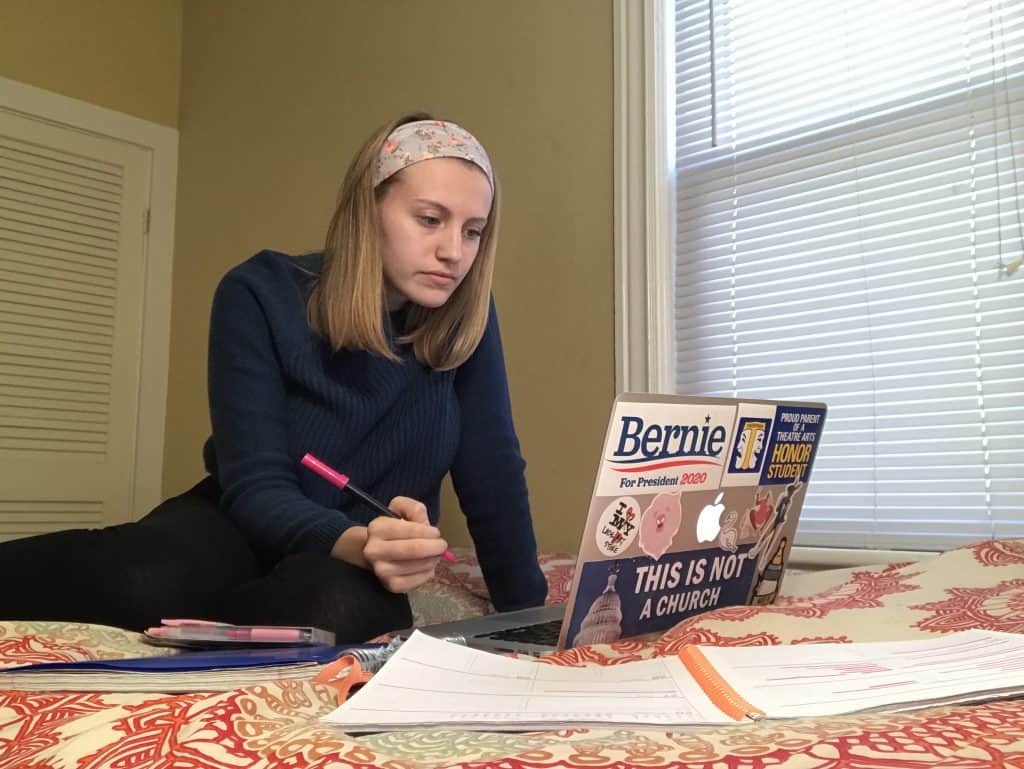

Haddonfield Memorial High School junior Evelyn Ellis had plans. Plans to spend summer in the South. Plans to continue working with Bracelets for Change and her other charitable endeavors. Plans for prom, hanging out with friends, singing, working in theater and celebrating a job well done after juggling so many advanced placement and accelerated courses.
But the rapid spread of coronavirus has, at worst, derailed these plans, and at best, forced them to take on a different tone. With all classes in the district held online until further notice and all extracurriculars postponed until further notice or cancelled, Ellis and hundreds of borough students are in the same boat.
They’re just trying to figure out how to adjust to the “new normal.”
“(My course load) is not super stressful, but aside from all my classes, I also have drama every day, and I’m a stage manager, so that usually left me getting home at 5 or 6 each night,” Ellis said of her usual in-school routine.
“But, I’ve been struggling a lot with (having school online). Mostly, it’s because I like to keep myself busy. When I don’t have time to do things, I tend not to procrastinate. Having more time on my hands usually means I don’t have the focus to get things done.”
Ellis admitted she’s finding it difficult in the early stages of online schooling to establish a routine, because the situation is unlike anything she or her peer group could have imagined.
“We’ve really never known any other structure. If not for the one we have in high school, then the ones provided by our parents,” she said.
Oddly enough, this extra time embedded in each day has afforded her the chance to pick up a pair of hobbies she never before considered: yoga and knitting. It’s also provided a chance to take a breath when taking time to indulge in these new pursuits.
“They’re both something to completely start over with, and since I’m not around people a lot now, I don’t have to compare myself to others,” Ellis said. “If I’m not good at it right away, I have the space that I can work on it.”
One thing that’s impossible to work around for a generation raised on technology is the sharp increase in electronic engagement in the absence of outside distractions.
“I find it very difficult, especially seeing my screen time come back to me, seeing that it’s six hours each day, and that’s scary,” Ellis admitted.
“I talk to a lot of my friends and they say they have a headache at the end of the day from all the electronic time. I find it harder to take breaks from technology, being online all day. It’s much easier to watch a show on my computer — which is already out — than finding other things to do.”
Another factor weighing heavily on their minds is the uncertainty of it all. Although coronavirus has put many things on hold indefinitely, there is the possibility that school could, at some point, be back in session and milestones like prom and movie nights and friendly meet-ups could occur in the open.
“It could all not be true, we could all be back in school and it all could happen. It’s a difficult adjustment not getting that closure. We also realize teachers, though mentors and carrying that wisdom, don’t have the answers. It all feels like someone has the answers but isn’t telling us, but if we ask it the right way, they will,” Ellis said.
“But on the bright side, it’s also a time for some really creative people to have the time and space to create some great things while we’re waiting.”
Though young, high-school-aged students can show remarkable flexibility with a number of challenges. Ellis believes her peers will come out of this with better ways to cope.
“I think we all underestimate our ability to adapt. I think everyone will come out of this with a new perspective. The first month is going to be rough, but I think everyone will settle into their respective routines,” she offered.
“I feel a little bit better than I did a week ago. Looking at this in the long term has helped me a lot. It’s comforting to think, in a year, this will be nothing.”









